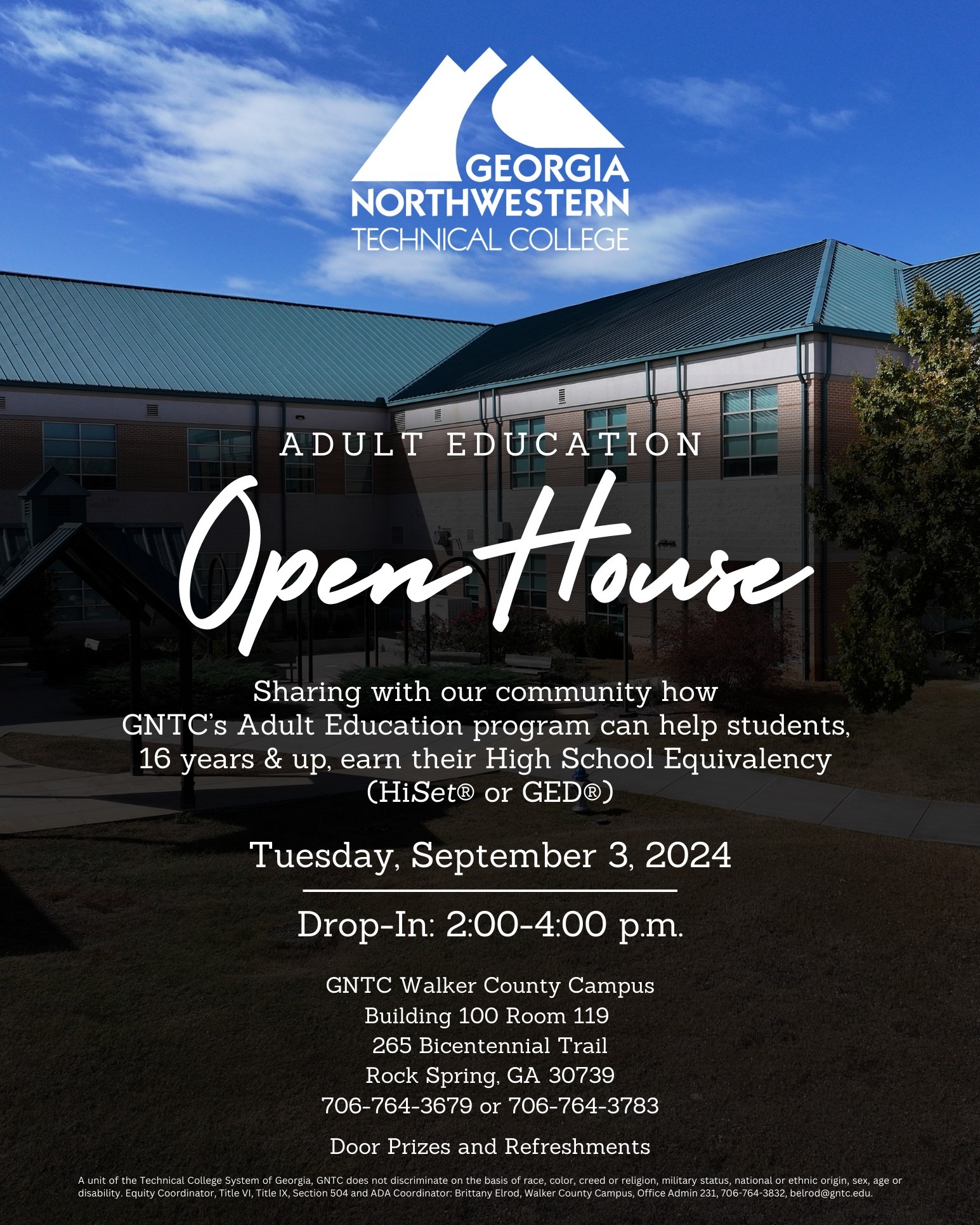GNTC to host Adult Education Open House – AllOnGeorgia


Georgia Northwestern Technical College (GNTC) Adult Education Open House

About the Event
Georgia Northwestern Technical College (GNTC) is hosting an Adult Education Open House to provide an opportunity to learn more about the Adult Education programs offered at GNTC, tour the facilities, and meet faculty and staff.
Date and Location
The event will take place on GNTC’s Walker County Campus at 265 Bicentennial Trail, Rock Spring on Tuesday, September 3, from 2-4 p.m.
Programs Offered
The Open House event will include information and assistance on enrolling in free classes including:
- Preparation courses for the HiSet® or GED® high school equivalency tests
- Adult basic education
- Adult secondary education
- English as a Second Language
Classes operate year-round on the Georgia Northwestern Technical College calendar for fall, spring, and summer semesters. Adults of all ages who have not graduated from high school in the United States or Canada or previously earned a high school equivalency and who are at least 18 years old are eligible to enroll in classes at no charge.
Youth Success Academy
Attendees will also have the opportunity to learn about GNTC’s Youth Success Academy. The Youth Success Academy is specifically designed for out-of-school youth who wish to attain a high school equivalency and technical education. The participants in the program will be involved in:
- High school equivalency test preparation
- Job Readiness Workshops
- Leadership Activities
The WIOA Youth Success Academy is sponsored through a partnership with GNTC and Northwest Georgia Regional Commission. Those who are eligible may apply for travel and childcare stipends. Referrals may come through any number of sources, including self-referral.
Additional Information
There will be refreshments and door prizes at the event. For more information, contact adulted@gntc.edu or 706-764-3679.
About Georgia Northwestern Technical College
Georgia Northwestern Technical College provides quality workforce education to the citizens of northwest Georgia. Students have the opportunity to earn an associate degree, diploma, or a certificate in aviation, business, health, industrial, or public service career paths. This past year, 12,241 people benefited from GNTC’s credit and noncredit programs. GNTC has an annual credit enrollment of 8,031 students and an additional enrollment of 4,210 people through adult education, continuing education, business and industry training, and Georgia Quick Start. GNTC is accredited by the Southern Association of Colleges and Schools Commission on Colleges to award associate degrees. A unit of the Technical College System of Georgia, as set forth in its student catalog, GNTC complies with applicable Federal civil rights laws and does not discriminate on the basis of race, color, creed or religion, national or ethnic origin, sex (including pregnancy, sexual orientation and gender identity), disability, age, political affiliation or belief, genetic information, veteran or military status, marital status or citizenship status (except in those special circumstances permitted or mandated by law). Equity Coordinator, Title VI, Title IX, Section 504 and ADA Coordinator: Brittany Elrod.
SDGs, Targets, and Indicators
1. Which SDGs are addressed or connected to the issues highlighted in the article?
- SDG 4: Quality Education
- SDG 8: Decent Work and Economic Growth
- SDG 10: Reduced Inequalities
2. What specific targets under those SDGs can be identified based on the article’s content?
- SDG 4.3: By 2030, ensure equal access for all women and men to affordable and quality technical, vocational, and tertiary education, including university.
- SDG 8.6: By 2020, substantially reduce the proportion of youth not in employment, education, or training.
- SDG 10.2: By 2030, empower and promote the social, economic, and political inclusion of all, irrespective of age, sex, disability, race, ethnicity, origin, religion, or economic or other status.
3. Are there any indicators mentioned or implied in the article that can be used to measure progress towards the identified targets?
- Indicator for SDG 4.3: Proportion of youth and adults with information and communications technology (ICT) skills, by type of skill.
- Indicator for SDG 8.6: Proportion of youth (aged 15-24 years) not in education, employment, or training.
- Indicator for SDG 10.2: Proportion of people living below 50 percent of median income, by age, sex, and persons with disabilities.
Table: SDGs, Targets, and Indicators
| SDGs | Targets | Indicators |
|---|---|---|
| SDG 4: Quality Education | 4.3: By 2030, ensure equal access for all women and men to affordable and quality technical, vocational, and tertiary education, including university. | Proportion of youth and adults with information and communications technology (ICT) skills, by type of skill. |
| SDG 8: Decent Work and Economic Growth | 8.6: By 2020, substantially reduce the proportion of youth not in employment, education, or training. | Proportion of youth (aged 15-24 years) not in education, employment, or training. |
| SDG 10: Reduced Inequalities | 10.2: By 2030, empower and promote the social, economic, and political inclusion of all, irrespective of age, sex, disability, race, ethnicity, origin, religion, or economic or other status. | Proportion of people living below 50 percent of median income, by age, sex, and persons with disabilities. |
Based on the article, the issues highlighted are connected to SDGs 4, 8, and 10. SDG 4 focuses on quality education, SDG 8 focuses on decent work and economic growth, and SDG 10 focuses on reducing inequalities. The specific targets identified from the article include ensuring equal access to affordable and quality education, reducing the proportion of youth not in employment, education, or training, and promoting social and economic inclusion for all. The indicators mentioned in the article that can be used to measure progress towards these targets include the proportion of youth and adults with ICT skills, the proportion of youth not in education, employment, or training, and the proportion of people living below 50 percent of median income.
Source: allongeorgia.com








